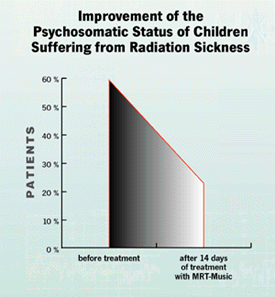They stayed in hospital for 14 days and received every day a 30 minute treatment with Medical Resonance Therapy Music®. The psychosomatic status was evaluated by the help of the Spielberger-Khanin scale.
Prior to the treatment 59,1% of the children displayed great personal unrest, they felt great strain and grave worries about the possibility of an unsuccessful outcome of the treatment of their illnesses.
Likely complications and side-effects arising from various forms of treatment produced nervous reactions in them.
Result
The evaluation of the Spielberger-Khanin scale documented in all children:
The percentage of children experiencing a high level of personal unrest fell from 59,1% to 22,7%.The evaluation of the Spielberger-Khanin scale documented in all children:
- a clear release of stress
- a great reduction in fear about the possibility of an unsuccessful outcome of the treatment of the illness
- a decrease in worry and inhibitions and
- a decrease in nervous reactions
It became obvious how through these reductions of fears and worries also the somatic disease reduced and the children became healthier.
Investigators:
Dr. med. L. Tkatschenko

